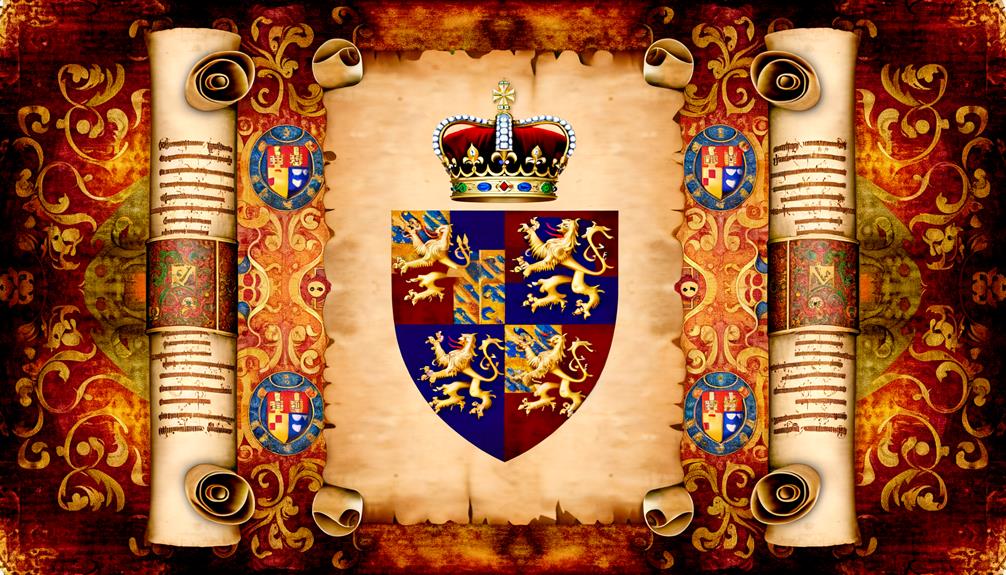Meaning of the Name Alfonso
The name Alfonso originates from the Visigothic name 'Adalfuns,' combining 'adal' meaning 'noble' and 'funs' meaning 'ready' or 'eager.' It evolved through linguistic transformations influenced by historical events into the Old Spanish 'Alfonso.' The Gothic roots link to 'Hildefuns,' which means ‘eager for battle' or 'noble warrior.' This name was further adapted by Latin influences into 'Adefonsus,' showcasing its resilience across cultures. Notable historic figures named Alfonso, such as the Spanish and Portuguese kings, highlight its enduring prestige and authority.
Discover more about the cultural significance and enduring appeal of Alfonso further below.

Key Takeaways
- Alfonso derives from the Visigothic 'Adalfuns,' meaning 'noble' and 'ready' or 'eager.'
- The name symbolizes nobility, readiness, and authority, especially in European monarchies.
- Historical figures like Alfonso VI and Alfonso X highlight its association with leadership and royalty.
- Variations such as 'Alfie' and 'Fonso' demonstrate the name's cultural adaptability.
- Alfonso remains popular in Spanish, Italian, and Portuguese-speaking regions due to its historical and cultural significance.
Origins of Alfonso
Tracing its roots back to the Germanic languages, the name Alfonso is derived from the Visigothic name 'Adalfuns,' composed of the elements 'adal' meaning 'noble' and 'funs' meaning 'ready' or 'eager.'
This etymology reflects the cultural values of the Visigoths, who prized nobility and readiness for battle or leadership. The name's evolution into its current form illustrates the linguistic transformations influenced by historical events, such as the migration of the Visigoths into the Iberian Peninsula.
Over centuries, 'Adalfuns' transformed phonologically and orthographically, becoming 'Alfonso' in Old Spanish. This transformation underscores the dynamic interplay between language and culture, highlighting the importance of names in preserving historical and societal contexts.
Gothic Roots
The name Alfonso, with its roots firmly entrenched in Gothic heritage, encapsulates the linguistic and cultural legacies bequeathed by the Visigothic tribes.
Originating from the Gothic name *Hildefuns*, which combines 'hilds' (battle) and 'funs' (eager, ready), Alfonso signifies 'eager for battle' or 'noble warrior.'
The Visigoths, a Germanic people who settled in the Iberian Peninsula during the early Middle Ages, profoundly influenced the region's onomastic traditions. Their language, a branch of the East Germanic languages, integrated into the local lexicon, leaving indelible marks on names and titles.
The endurance of such names highlights the Visigoths' lasting impact on subsequent generations, preserving their martial and noble ethos through the legacy of names like Alfonso.
Latin Influence
The Latin influence on the name Alfonso is pivotal when analyzing its historical Latin origins and subsequent evolution in etymology.
The name, derived from the Gothic 'Adalfuns,' was adapted into Latin as 'Adefonsus,' reflecting the linguistic and cultural integration within Roman territories.
This adaptation not only signifies the name's resilience but also its cultural significance, as it became widely recognized and respected in Latin-speaking regions.
Historical Latin Origins
How did the name Alfonso, with its rich historical Latin origins, evolve from its classical roots to become a prominent name in various cultures?
The name Alfonso traces back to the Latinized form of the Gothic name 'Adalfuns,' composed of 'adal' (noble) and 'funs' (ready or keen). This nomenclature first appeared during the Visigothic rule in the Iberian Peninsula, where the Latin influence was paramount.
The Latinization of Gothic names was a common practice, reflecting the synthesis of Roman and Germanic cultures. Over centuries, Alfonso embedded itself in the sociopolitical fabric of medieval Spain and Portugal, becoming a favored name among royalty and nobility, and later spreading across Europe and the Americas through exploration and colonization.
Name Etymology Evolution
In tracing the etymological evolution of the name Alfonso, Latin influence played a pivotal role in its transformation from the Gothic 'Adalfuns' to its contemporary forms. The name, initially composed of the elements 'adal' (noble) and 'funs' (ready), underwent significant adaptation as it traversed through Latin-speaking regions. This evolution can be observed through various linguistic changes which were influenced by phonetic and cultural shifts over time.
| Original Gothic | Latin Influence | Modern Form |
|---|---|---|
| Adalfuns | Adalfunsus | Alfonso |
| Adalfuns | Alafonsus | Alphonso |
| Adalfuns | Alfonsus | Alphonse |
| Adalfuns | Alfonsus | Alfonzo |
| Adalfuns | Alafonsus | Alonso |
Such transformations highlight the dynamic nature of language and the enduring legacy of Latin's impact on name etymology.
Cultural Significance in Latin
Frequently revered in historical texts and cultural narratives, the name Alfonso carries substantial significance within Latin contexts, reflecting both its noble roots and the profound impact of Roman civilization on European nomenclature.
Deriving from the Gothic elements *hilds* (battle) and *funs* (ready), Alfonso was adapted into Latin as *Ildefonsus*. This transformation highlights the Roman practice of integrating and Latinizing names from conquered cultures, ensuring their legacy within the Roman Empire's extensive reach.
The name's prevalence in medieval Latin documents underscores its enduring appeal among European aristocracy, who often adopted Latinized versions of Gothic names to emphasize their lineage and prestige.
Consequently, Alfonso stands as a reflection of the lasting influence of Latin on European names and cultural identity.
Historical Figures Named Alfonso
The name Alfonso has been borne by numerous influential figures throughout history, particularly among Spanish royalty, underscoring its enduring legacy.
Prominent kings named Alfonso, such as Alfonso VI and Alfonso X of Castile, played pivotal roles in shaping medieval Europe through their political and cultural contributions.
Their reigns reflect the name's deep historical roots and its significance in broader sociopolitical contexts.
Prominent Spanish Kings
Throughout Spanish history, several monarchs named Alfonso have played pivotal roles in shaping the nation's political and cultural landscape.
Alfonso VI, known as 'El Bravo,' reigned during the late 11th century and was instrumental in the Reconquista, reclaiming Toledo from Moorish control.
Alfonso X, 'El Sabio,' in the 13th century, was celebrated for his scholarly contributions, fostering a cultural renaissance that included the Alfonsine Tables and the Siete Partidas legal code.
Alfonso XIII, whose reign spanned from 1886 to 1931, navigated Spain through tumultuous periods, including World War I and the establishment of the Second Spanish Republic.
The etymology of 'Alfonso,' derived from the Germanic elements 'adal' (noble) and 'funs' (ready), underscores the name's historical resonance.
Alfonso in Medieval Europe
Numerous medieval European figures named Alfonso, particularly in the Iberian Peninsula, greatly influenced the political and cultural dynamics of their respective eras, underscoring the widespread use and enduring legacy of the name. Originating from the Gothic "Adalfuns," meaning "noble and ready," the name was borne by several prominent rulers. Kings such as Alfonso VI of León and Castile, who reconquered Toledo, and Alfonso X, known as "El Sabio" (The Wise), epitomized the name's regal and intellectual heritage. Their reigns were marked by significant advancements in law, literature, and science, shaping medieval European history.
| Historical Figure | Notable Contribution |
|---|---|
| Alfonso VI | Reconquest of Toledo |
| Alfonso I of Aragon | Expansion of Aragonese territories |
| Alfonso II | Consolidation of the Kingdom of León |
| Alfonso III | Strengthening of Christian kingdoms |
| Alfonso X | Promotion of legal and cultural reforms |
Alfonso in Royalty
Alfonso, a name steeped in regal heritage, has graced the lineage of numerous European monarchies, particularly within the Iberian Peninsula, where it has been borne by several notable kings of Spain and Portugal.
The name's etymology traces back to the Germanic elements 'adal' (noble) and 'funs' (ready, prompt), reflecting traits highly valued in royal leadership.
Historically, figures such as Alfonso VI of León and Castile and Alfonso I of Portugal played pivotal roles in shaping their kingdoms' political and cultural landscapes. These monarchs not only solidified territorial boundaries but also promoted the spread of Christianity, aligning with the Reconquista efforts.
Therefore, the name Alfonso symbolizes a legacy of nobility, readiness, and influential governance in European royalty.
Cultural Significance
The cultural significance of the name Alfonso extends beyond its royal connotations, deeply rooted in linguistic traditions and historical contexts that have shaped its perception through the ages.
Originating from the Germanic elements 'adal' (noble) and 'funs' (ready), the name encapsulates a sense of preparedness and nobility. This etymological richness contributes to its enduring appeal in various cultures.
Historically, Alfonso has been a favored name among Spanish and Portuguese royalty, which has imbued it with a sense of authority and gravitas. Additionally, the name's prevalence in literature and arts further cements its cultural importance, often symbolizing leadership and wisdom.
Hence, Alfonso remains a name that resonates with historical prestige and linguistic depth, transcending mere nomenclature.
Popularity Over Time
Tracing the popularity of the name Alfonso over time reveals a fascinating interplay of historical events, cultural shifts, and linguistic evolution that has influenced its adoption across different eras and regions.
Originating from the Germanic name Alfons, meaning 'noble and ready,' Alfonso gained prominence in medieval Spain and Italy, especially among royalty and nobility. Its presence in historical texts and records highlights its association with power and prestige. The name's popularity surged during the reigns of notable figures such as Alfonso VI of León and Castile.
However, its usage saw a decline in more modern times due to changing naming trends and cultural influences. Despite this, Alfonso remains a name with deep historical roots and enduring significance.
Variations and Nicknames
Throughout its long history, the name Alfonso has evolved into various forms and inspired numerous nicknames, reflecting its widespread influence and adaptability across different cultures and languages. Originating from the Germanic elements 'adal' (noble) and 'funs' (ready), the name has been adapted to various linguistic contexts.
In Spanish, it often shortens to 'Alfie' or 'Fonso,' while in Italian, it becomes 'Alfonso.' Portuguese speakers might use 'Afonso.' In the German context, the name can appear as 'Alfons.' Each variant carries the inherent nobility and readiness of the original, showcasing the name's ability to traverse cultural boundaries.
These variations and nicknames highlight the name's broad appeal and historical resonance, maintaining its relevance through centuries.
Modern Usage and Trends
In contemporary times, the name Alfonso has seen a resurgence in popularity, driven by a renewed appreciation for names with deep historical roots and multicultural resonance. This revival can be attributed to various factors:
- Historical Significance: The name traces back to Germanic origins, denoting nobility and readiness.
- Literary Presence: Featured in classic literature and modern media, bolstering its appeal.
- Cultural Diversity: Common in Spanish, Italian, and Portuguese-speaking regions, adding a global touch.
- Celebrity Influence: High-profile figures named Alfonso enhance its visibility and desirability.
- Timeless Quality: Its longevity and regal connotations make it a timeless choice.
Thus, Alfonso's modern usage reflects a blend of historical reverence and contemporary relevance, appealing to a broad demographic.
Conclusion
The name Alfonso, with its Gothic origins and Latin influence, has carved a majestic path through history. Embodied by royalty and historical figures, it evokes images of grandeur and cultural significance.
Over centuries, Alfonso's popularity has ebbed and flowed, adapting through variations and affectionate nicknames. Today, it stands as a tribute to enduring legacy, its roots intertwined with the rich tapestry of linguistic evolution and historical context.
The name Alfonso remains a symbol of noble heritage and timeless appeal.






